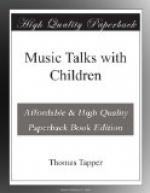From this we shall have courage to know that what we pursue in music is real; that the beauties of great music, though they may just now be beyond us, are true, and exist to those who are prepared for them. When in our struggle to be more capable in art than we are to-day we think of the beauty around us, and desire to be worthy of it, we are then forming an ideal, and ideals are only of value when we strive to live up to them.
Once in Rome there lived a Greek slave—some day you may read his name. He has told us, that “if thou wouldst have aught of good, have it from thyself."[61] Of course we see in this, immediately, the truth that has been spoken of in nearly every one of these Talks. It is this: We must, day by day, become better acquainted with ourselves, study our thoughts, have purity of heart, and work for something.
Now, working for something may be accomplished in a simple manner without thinking of it. If every task is done in our best way it adds something to us. It is true and beautiful, too, that the reward for patient, faithful work comes silently to us, and often we do not know of its presence. But some day, finding ourselves stronger, we look to know the cause of it, and we see that the faithfulness of past days has aided us.
So art teaches us a very practical lesson in the beginning. If we would have her favors we must do her labors. If we say to music: “I should love to know you;” music says to us, “Very well, work and your wish shall be gratified.” But without that labor we cannot have that wish. The Greek slave knew that and said:
“Thou art unjust, if thou desire to gain those things for nothing.”
Now we begin to see that art has no gifts to bestow upon us for nothing. Many think it has, and pursue it until the truth dawns upon them; then, because of their error, they dislike it. To recognize the truth about art and to pursue that truth, despite the hard road, is to have courage. And the Ideal is nothing else than the constant presence of this truth.
And what do we gain by pursuing it? Not common pleasure, but true happiness; not uncertainty, but true understanding; not selfish life, but true and full life. And we can see the beauty of art in nothing more plainly than in the fact that all these things may come to a child, and a new and brighter life is made possible by them.
The very first day we came together, the little child said to the master:
“Master, I do not understand what thou hast said, yet I believe thee.”
It is hard, sometimes, to feel the truth and to keep it with us; hard, not only for a child, but for any one; and yet, if with faith we will labor with it until the light comes, then we are truly rewarded and made richer according to our faith.
We must not forget in the first days, as we leave our music, that the path we have taken since we came together is the hardest; not for always, but for now. The right path is hard at first—the wrong one is hard always.




